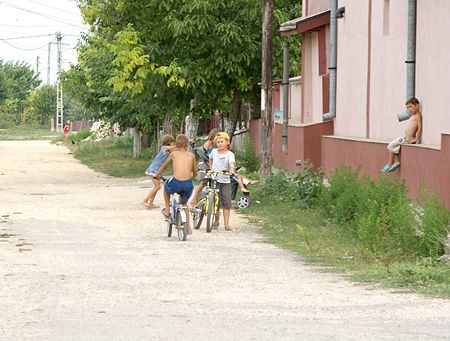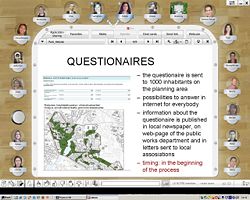Assessing Everyday Landscapes 2011
Course Description and Learning Objectives
This seminar aims to combine two learning objectives:
- to understand and apply different landscape assessment approaches
- to discuss the concept of ‘Everyday Landscapes’.
Background, theory, purpose and application of different landscape assessment approaches will be presented by taking a variety of international perspectives. Student participants will, parallel to a lecture series, apply assessment methods by performing small assessment projects (train and test in practice).
For their assessment students select ‘everyday landscapes’ that are located in an environment they use ‘every day’. Small international groups of participants will compare assessment findings and reflect on the different approaches taken.
The focus on ‘Everyday Landscapes’ relates to core principles of both the European Landscape Convention and the (emerging) International Landscape Convention. These Conventions call for a new understanding and validation of people’s everyday environment.
- Fragmented into various components that are green, grey or blue, agricultural, historical or ecological, landscapes are often undervalued and neglected, seemingly belonging to everyone, but actually to no one.
(IFLA Leaflet Towards an International Landscape Convention)
Structure
Three phases of teaching and learning are organised to be held between 25th of October 2011 and 30th of January 2012. The seminar will be conducted online and include international groups of students that are working at different locations. Adobe Connect Software is used as virtual classroom and this WIKI for communication, organisation and asynchronous collaboration of students.
- Part I: Introduction to Landscape Assessment 6 online sessions with short student presentations, interactive tools and (guest)lectures
- Part II: Behaviour Patterns 3 online sessions with student presentations
- Part III: Awareness Raising 4 online sessions with lecture, student presentations and discussion
for more details, please see:
Time Frame
- 13 online meetings taking place from October 25 2011 - January 30 2011, Tuesdays from 18.00 - 19.30 pm CET in the Adobe Connect Seminar Room (invitations to this room will be sent to participants by e-mail)
- Your local time? See Time Zone Conversion
- Participants will be able to login from 17.30 pm CET for informal questions & answers.
- Please make sure to log in at least 10 mins before official starting time for appropriate soundcheck so that we can start the session on time!!
- Optional work before and/or after online meeting time in individual groups.
Assignments
Performance assessments are based on successful completion of four assignments. Depending on the number of completed assignments, the seminar workload translates into two or three ECTS. Students may earn 3 ECTS if they agree, with their supervisor, on one additional assignment.
- Assignment 1: Analytical drawing of "Everyday Landscape" study area.
- Assignment 2: Landscape Layers and Elements - 'classical' analysis of study area (depending on availability of data).
- Assignment 3: Observation and description of behaviour patterns in the study area.
- Assignment 4: Awareness Raising - development of a strategy for raising the public awareness of the study area.
for more details, please see:
Target Group
- This course is designed for Master students in landscape architecture. 3rd year bachelor students may also participate.
- The course language is English. Efficient skills in both speaking and writing are presumed.
- Good levels of independence and willingness to work in a group are expected.
Participating Universities:
- University of Applied Sciences Nürtingen, Germany // /International Master of Landscape Architecture (IMLA) – Ellen Fetzer
- Kassel University, Germany // School of Architecture, Urban Planning and Landscape Architecture – Diedrich Bruns, Kun Zhang
- University of Buenos Aires, Argentina // School of Agriculture, Landscape Planning and Design MLA Damian Perez Andres
- Ankara University, Turkey// Faculty of Landscape Architecture Prof. Dr. Nilgul Karadeniz
Technological Requirements
- stable internet connection (DSL)
- PC or laptop with Windows operating system (or MAC with a different client)
- headset (microphone and earphones)
- registered participants will receive a link and log-in to the ViTeRo (Virtual Team Room) Program page for download
How to contribute as a speaker
If you are invited as a speaker in one of the plenary sessions you will be asked to prepare for a 20 - 30 minute presentation in the form of a slideshow (final format: pdf file). Since plenary sessions usually take 90 minutes, presentations are often followed by a moderated discussion (15 mins introduction, 30 mins presentation plus 30 - 45 minutes discussion).
Guidelines for presentations
Please consider the following aspects when you are preparing for a presentation:
- Please avoid written information on the slides except for the most essential statement and questions. As you will be talking synchronously to the audience, there is absolutely no need to add much textual information on the slides.
- Please add many visuals and use the space given. You may not add a number of small images on one slide. Use several slides, each with one image.
- If you have questions to the audience (e.g. at the end in order to stimulate the discussion) you should visualise the question on the slide.
- Please send your presentation in good time to the seminar coordinator (at least two days before the meeting). We then have the chance to propose changes or additions in order to make your presentation more suitable for a virtual classroom setting.
Contact and Organisation
Nürtingen-Geislingen University, Germany // Study Programme International Master of Landscape Architecture
email: ellen.fetzer(at)hfwu.de

